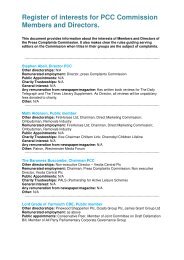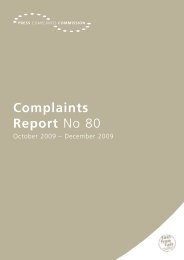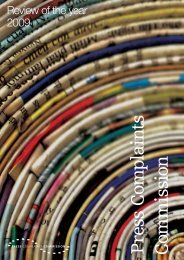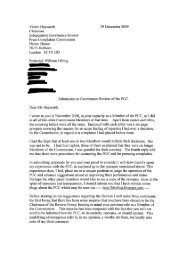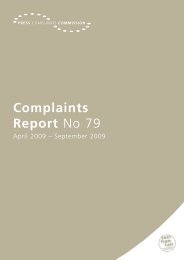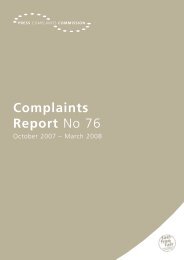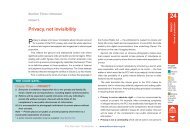2008 - Press Complaints Commission
2008 - Press Complaints Commission
2008 - Press Complaints Commission
You also want an ePaper? Increase the reach of your titles
YUMPU automatically turns print PDFs into web optimized ePapers that Google loves.
T H E C H A I R M A N ’ S R E P O R T<br />
LOOKING BACK.<br />
MOVING FORWARD.<br />
Sir Christopher Meyer reflects on developments during his time as Chairman and<br />
outlines key challenges facing the <strong>Press</strong> <strong>Complaints</strong> <strong>Commission</strong> in the years ahead.<br />
What have been the main changes to the PCC over<br />
the last 6 years?<br />
The PCC has transformed itself in a number of ways. This has<br />
been not only the result of major reforms introduced in 2003<br />
just after I became Chairman; but also of a change of attitude<br />
– more pro-active, more strategic – inside the PCC itself.<br />
It was clear six years ago that the PCC needed to raise its<br />
game and reinforce its credibility. That meant taking steps to<br />
enhance accountability, transparency, visibility and<br />
independence. So, we did a number of things:<br />
• We increased the independent majority on the <strong>Commission</strong>;<br />
• We made appointments to the <strong>Commission</strong> far more<br />
transparent through public advertising;<br />
• We created the post of Charter <strong>Commission</strong>er – to whom<br />
members of the public can appeal if they think their<br />
complaint has been badly handled – to reinforce trust<br />
in our impartiality;<br />
• We created an independent audit body – the Charter<br />
Compliance Panel – to improve the way we do our work;<br />
• We ensured the editors’ Code of Practice is now reviewed<br />
every year; and we created the Editors’ Codebook – about<br />
to appear in its second edition – as an indispensable guide<br />
for journalists to the interpretation of the Code, which<br />
helps keep standards high in newsrooms;<br />
• We made ourselves far more accessible, travelling across<br />
the UK with a programme of open days and workshops to<br />
explain to the public at large how to make use of the PCC;<br />
• We aggressively promoted our 24 hour helpline, which<br />
enables us to stop harassment and to tackle concerns<br />
before they turn into full-blown complaints.<br />
What has been your greatest achievement?<br />
There is now a general consensus across the political<br />
spectrum that for online and print publications selfregulation<br />
is the only way to go. That was not the case six<br />
years ago, when the PCC’s very existence was in question. We<br />
have raised standards and got the PCC far better known<br />
across the UK. Customer approval ratings have gone up from<br />
around 60% to 80%, while the number of people coming to<br />
us for help has almost doubled since 2003.<br />
We have raised standards<br />
and got the PCC far better<br />
known across the UK.<br />
Customer approval ratings<br />
have gone up from around<br />
60% to 80%<br />
And your greatest frustration?<br />
My greatest frustration is that newspapers and magazines<br />
still do not give sufficient publicity in their own pages to the<br />
existence of the PCC and the services it offers. It is after all in<br />
their own interest to make the self-regulatory system better<br />
known: not least because of the money they save if people<br />
come to us rather than go to law! Though there has been an<br />
improvement, the press needs to do far more in print and<br />
online to advertise our services.<br />
Have there been any particularly memorable moments?<br />
Our very first Open Day in Manchester in 2003 was<br />
memorable for two things: waiting in some trepidation at<br />
Manchester Art Gallery to see how many people would come<br />
in off the streets to hear us (in the end a respectable 100 or<br />
so); and afterwards having a drink with a broad cross-section<br />
of Mancunians, followed by an excellent, blazing-hot curry in<br />
one of the largest curry houses I have ever visited.<br />
Thinking about privacy and the law, are the developments over<br />
the last 6 years a change for the better or worse for the PCC?<br />
It is not a question of better or worse. The law and<br />
self-regulation should not be regarded as competitors.<br />
There is a time for the courts and a time for the PCC. The<br />
advantage of coming to us on a privacy matter is that we<br />
will deal with it cost-free, very fast compared to the courts<br />
(sometimes within a matter of minutes), and without the<br />
public rehearsal – sometimes in excruciating detail – of the<br />
very issue that prompted the complaint in the first place. This<br />
is why last year we made a record number of privacy rulings,<br />
far in excess of those handed down by the courts. But if you<br />
are looking for damages, then obviously you will go to law.<br />
The challenge for us is, I think, three-fold: to ensure that the<br />
courts take account not only of the Code of Practice, but also<br />
the way in which we have interpreted its privacy clauses; to<br />
ensure that there is a proper distinction, both in law and the<br />
Code, between “real” privacy and, say, the wish of celebrities<br />
to control their own publicity; and to have recognised the<br />
real results the PCC can achieve so that people are<br />
encouraged to use us when they need to.<br />
Is it possible to tell whether standards in press reporting<br />
have improved or deteriorated in the last 6 years?<br />
They have and they haven’t. Respect for individuals’ privacy<br />
is, I think, higher – and our adjudications in this area more<br />
influential. And the co-operation with our behind-the-scenes<br />
preventative work has kept many a problem from arising<br />
(as recognised by the 2007 Select Committee inquiry).<br />
But the volume of information and speed of its publication<br />
online have led to lapses that wouldn’t be seen in print<br />
publications. This is a developing trend which will need<br />
to be addressed.<br />
Why were there a record number of complaints in <strong>2008</strong>?<br />
It’s much easier to complain these days, and I think there is<br />
more ‘activism’ online which leads to campaigns against<br />
particular stories. For instance, we had over 500 complaints<br />
about one piece last year from disgruntled cyclists. There is<br />
greater awareness of what the PCC can do too – and the better<br />
publications link from their websites straight through to ours.<br />
<strong>2008</strong> saw a record number of resolved complaints, but just<br />
45 complaints adjudicated. What do you say to those who<br />
think that in favouring resolution over adjudication the PCC<br />
‘lets off’ editors who err?<br />
This is not either/or. We cannot lose sight of our founding<br />
mission back in 1991: to resolve, where possible, the public’s<br />
complaints. Our experience over the last 18 years has taught<br />
us that what people want above all are quick, effective<br />
remedies in the form of prominent apologies and corrections.<br />
That is why the PCC excels as a mediation service.<br />
The threat of a critical adjudication focuses editors’ minds on<br />
the need to settle disputes quickly and fairly. But if an offer is<br />
inadequate, or a breach of the Code is so serious it cannot be<br />
resolved, we will adjudicate it formally and publicly censure<br />
the editor. If we were artificially to inflate the number of<br />
adjudications by a less than thorough attempt at mediation,<br />
the system would clog up to the detriment of the thousands<br />
who come to us each year for speedy assistance.<br />
Our experience over the last 18<br />
years has taught us that what<br />
people want above all are quick,<br />
effective remedies in the form<br />
of prominent apologies and<br />
corrections. That is why the PCC<br />
excels as a mediation service<br />
Were there lessons to be learned for the PCC and the press<br />
from the coverage of the suicide cluster in Bridgend?<br />
It reinforced the need to leap into action swiftly in situations<br />
like this. We took an early decision to go down to Bridgend<br />
to speak to people – but by the time things were organised<br />
several weeks had passed, and there had been further<br />
deaths. I am glad we managed to help a number of families<br />
there so that they weren’t too troubled by repeated visits<br />
from journalists when they were trying to grieve. But<br />
perhaps if we had got there sooner we could have done<br />
more. Suicide is a major issue of public concern and needs<br />
to be reported, but it’s right that the Code Committee has<br />
recognised that there are ways of doing so that do not<br />
accidentally cause further harm.<br />
One complaint about the press is that corrections and<br />
apologies are buried. Is this fair?<br />
Short answer: no. Longer answer: our report shows (page 18)<br />
that the vast majority of corrections and apologies appear on<br />
the same page as, or further forward than, the original<br />
article, or in a corrections column. In <strong>2008</strong>, we negotiated<br />
two front page apologies. The situation has got better over<br />
the last 6 years – but there’s always room for improvement.<br />
Looking ahead, what does media convergence mean for the<br />
architecture of regulation?<br />
In short, it means a greater role for self-regulation. Imposed<br />
forms of content regulation have no place in a globalised,<br />
digital media. The key qualities of self-regulation: industry<br />
buy-in; flexibility; collaboration; and the ability to get results<br />
quickly will all be seen as essential for future forms of media<br />
regulation, whichever medium is involved.<br />
4 5





